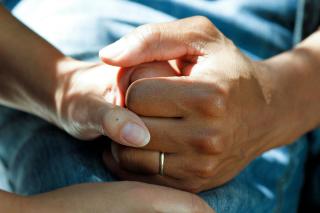This is a conversation between Lydia Ogden, Associate Professor in the Simmons University School of Social Work and Director of the Center for Innovation in Clinical Social Work and and Ivy Waikwa, an undergraduate student majoring in Psychology.
Could you tell me about the project you're currently working on for the Hazel Dick Leonard Faculty Fellowship?
Dr. Ogden: I'm currently involved in a research project focused on psychosocial clubhouses. These are unique spaces designed for individuals living with serious mental illnesses. Clubhouses prioritize providing support and opportunities for members in a destigmatizing and holistic environment. Staff and members, who may have serious mental illnesses themselves, work together to support each other's goals. The clubhouse typically offers vocational training, educational support, housing advocacy, and socializing opportunities. My research specifically examines the oral history of one such clubhouse, which has been around since 1987, and explores its impact on long-time members. The second piece of my project involves working closely with these older, long-term members to understand what aspects of the clubhouse benefit them. Through interviews and ethnographic methods, I'm delving into their personal stories and experiences within the clubhouse environment. I'm particularly interested in how the clubhouse fosters a sense of inclusion and belonging for older adults who often face social isolation and negative well-being outcomes.
What inspired you to embark on this research journey?
Dr. Ogden: My background as a social worker exposed me to the challenges faced by older adults with serious mental illnesses. I noticed a gap in services aimed at promoting their overall well-being and sense of purpose. This led me to pursue my PhD and explore alternative approaches to mental health care. My interest in clubhouses grew from observing the positive impact they had on individuals' lives during my previous research endeavors. I chose to focus on this project to better understand how clubhouses contribute to the well-being of older adults in particular and to advocate for their recognition within mental health service systems.
You mentioned the distinctiveness of clubhouses compared to traditional mental health settings. Could you elaborate on these differences?
Dr. Ogden: Certainly. Clubhouses differ significantly from psychiatric rehabilitation settings in several ways. In traditional settings, the focus is primarily on stabilizing mental health symptoms and treatment plans revolve around managing symptoms, medication adherence, and coping strategies. In contrast, clubhouses prioritize the individual's holistic well-being. Members are actively involved in vocational training, educational pursuits, and housing advocacy, alongside staff members. There's a sense of equality and camaraderie within the clubhouse, where staff and members work side by side, often indistinguishable from each other. Unlike clinical settings, there's no hierarchical structure; everyone's contributions are valued equally. Additionally, social events and community engagement activities foster a sense of belonging and purpose among clubhouse members. These differences create an environment that promotes social connection, personal growth, and community integration, which are essential for individuals living with serious mental illnesses.
You mentioned something about older individuals with mental illnesses potentially exhibiting behaviors that could pose a risk. How does the clubhouse ensure the safety of everyone involved?
Dr. Ogden: Absolutely, safety is a top priority. It's important to understand that individuals with serious mental illnesses are more likely to harm themselves than others. In fact, they're often more vulnerable to violence than being violent themselves. However, there is a slight increase in the risk of aggression, comparable to when someone with a mental illness has been drinking. But when individuals adhere to their prescribed medication, this risk becomes similar to that of the general population. Now, in the clubhouse, there's a clear code of conduct in place. If anyone behaves in a way that compromises safety or disrupts the environment, members or staff can report it immediately. Depending on the severity and frequency of the behavior, consequences range from being asked to leave for the day to suspension for a specified period. And regarding suicide or self-harm ideation, while it's a sensitive issue, it's essential to address. The clubhouse screens for risk and offers support, including referrals to appropriate treatments if needed. Even individuals with chronic suicidal thoughts can still participate in clubhouse activities, and studies have shown that active involvement often leads to a reduction in such thoughts and behaviors.
You highlighted the issue of stigma surrounding mental illnesses. How does the clubhouse provide refuge from such stigmatization?
Dr. Ogden: The clubhouse cultivates an atmosphere of acceptance and understanding towards mental health symptoms. Members embrace the diversity of experiences, realizing that many have gone through similar challenges. There's a sense of understanding, where judgment is replaced with empathy. Unlike clinical settings, where assessments often lead to stigmatization, the clubhouse welcomes individuals regardless of their symptoms, as long as they adhere to the established code of conduct.
You mentioned your academic endeavors, including writing papers and a book. How do you envision your project impacting those who engage with your work?
Dr. Ogden: Through academic publications, the aim is to elevate the clubhouse model within mental health discourse, challenging perceptions that favor more traditional treatments. The broader goal is to destigmatize serious mental illnesses and promote inclusion through understanding and empathy. My book seeks to bridge the gap between academia and the general public, shedding light on the lives of individuals with mental illnesses and advocating for their acceptance and integration into society.
What else would you like people to know about your project?
Dr. Ogden: I am truly passionate about this issue! I believe it's essential for people to understand that those with serious mental illnesses shouldn't be feared. Additionally, I've been contemplating the concept of "third spaces," introduced to me by my graduate research assistant, Lisa Vogel. These spaces exist beyond work and home, without the constraints of capitalism. Clubhouses serve as exemplary third spaces, fostering connections, support, and a sense of belonging, free from financial motives. I envision creating more such spaces for diverse communities to promote inclusivity and communal support.
Edited for length and clarity.

